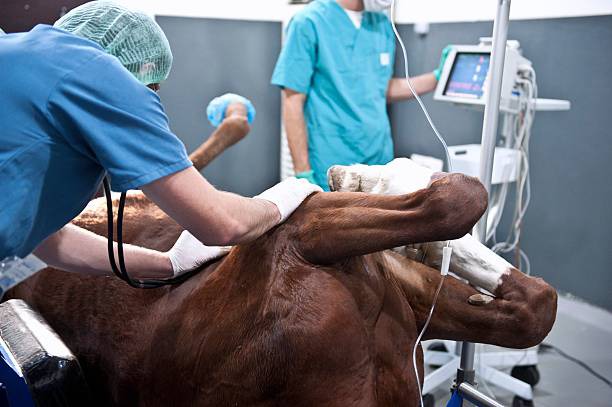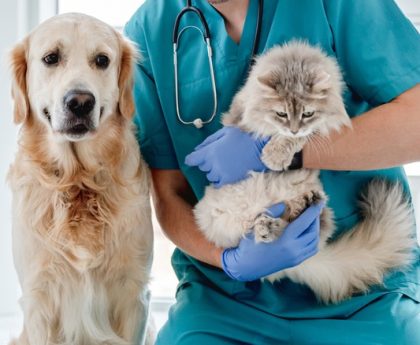Equine hospitals play a crucial role in maintaining horses’ health and well-being. These specialized facilities are equipped to handle a wide variety of medical needs, from routine check-ups to complex surgical procedures. But what types of surgery can equine hospitals perform? Let’s explore the exciting world of equine surgery and discover the incredible range of treatments available.
1. Orthopedic Surgery
Given horses’ size and activity level, orthopedic issues are sadly common. Therefore, it’s no surprise that orthopedic surgery is one of the most frequently performed procedures in equine hospitals.
Fracture Repair
Just like humans, horses can suffer fractures from accidents or falls. Fracture repair can involve a range of techniques, including the use of screws, pins, and plates. Once the horse is sedated, advanced imaging, such as X-rays, helps the veterinarian pinpoint the exact location and severity of the fracture. This enables a tailored surgical plan to ensure the best possible outcome. In such scenarios, it’s crucial to have access to specialized care like that provided by Bluegrass Equine Surgical Center equine emergency vet.
Joint Surgery
Joint issues such as arthritis or damaged cartilage can severely impact a horse’s mobility and quality of life. Equine hospitals often perform arthroscopy, a minimally invasive surgery to diagnose and treat joint issues. Using tiny instruments and a camera, the vet can resolve problems with less pain and faster recovery times for the horse.
2. Respiratory Surgery
Respiratory issues can be detrimental to a horse’s performance, particularly for those engaged in competitive sports. Equine surgery specialists at leading hospitals can perform several types of respiratory surgery to alleviate these problems.
Laryngeal Surgery
Laryngeal issues, such as roared or partial paralysis of the larynx, can impair a horse’s breathing. Laryngeal tie-back surgery is a common procedure where a suture is used to hold the airway open, allowing for better airflow. This type of surgery can significantly improve a horse’s performance and overall health.
3. Gastrointestinal Surgery
Gastrointestinal problems can be life-threatening for horses, requiring swift and effective surgical interventions.
Colic Surgery
Colic, a condition causing severe abdominal pain, can be caused by various reasons, such as twisted intestines or blockages. Colic surgery usually involves opening the horse’s abdomen to identify and rectify the problem. Timeliness is crucial here; the faster the horse gets into the operating room, the better its chances of recovery.
Impaction Surgery
Impaction occurs when food or foreign material blocks the intestines. Surgery might be needed to remove the blockage and ensure the intestines function properly. This procedure typically involves flushing the intestines with liquids and, sometimes, physically removing the blockage.
4. Reproductive Surgery
Reproductive health is essential for breeding and the general well-being of horses. Thus, equine hospitals often specialize in various reproductive surgeries.
Cesarean Section
In cases where a mare has difficulty delivering a foal naturally, a cesarean section may be warranted. This involves making an incision in the abdomen and uterus to deliver the foal safely. Quick action is crucial here to ensure the health and safety of both the mare and the foal.
Ovariectomy
Ovariectomy, or the removal of one or both ovaries, is performed on mares for a variety of reasons, ranging from behavioral issues to medical conditions like tumors. This surgery can be done using various techniques, such as laparoscopy, which minimizes recovery time and post-operative complications.
5. Eye Surgery
Eye problems can be particularly challenging in horses, given their size and the intricacies of their eyes. Equine hospitals can often perform complex eye surgeries.
Cataract Surgery
Cataracts can significantly impair a horse’s vision. Cataract surgery involves removing the clouded lens and, in some cases, replacing it with an artificial one. This delicate procedure can dramatically improve a horse’s quality of life.
Corneal Surgery
Corneal issues, such as ulcers or injuries, require precise surgical interventions to prevent further damage and restore vision. Using specialized surgical tools and techniques, veterinarians can effectively treat corneal problems, ensuring minimal discomfort and faster recovery for the horse.
6. Dermal Surgery
Skin issues in horses can range from benign growths to serious infections that need surgical intervention.
Removal of Tumors and Growths
Equine hospitals can remove skin tumors and growths, whether benign or malignant. The affected area is carefully excised, and depending on the nature of the growth, further treatments like radiation or chemotherapy might be considered.
Suturing Wounds
Equine hospitals also handle severe lacerations and wounds that require suturing. This includes debriding the wound, cleaning it thoroughly, and stitching it up to promote proper healing.
Advanced Technologies in Equine Surgery
The incorporation of advanced technologies has revolutionized equine surgery. From imaging techniques to surgical tools, these innovations have made surgeries safer and more effective.
Imaging Techniques
Using advanced imaging techniques like MRI, CT scans, and ultrasonography, veterinarians can diagnose issues more accurately. This enables precise surgical planning and execution, resulting in improved outcomes for the horse.
Minimally Invasive Techniques
Minimally invasive surgeries, such as arthroscopy and laparoscopy, have significant benefits. They reduce the size of incisions, minimize recovery time, and lower the risk of complications. This translates to a faster return to normal activities for your equine friend.
Choosing the Right Equine Hospital
Selecting the right equine hospital for your horse is crucial. Look for facilities that offer a comprehensive range of services and have experienced surgery specialists. The quality of care and specific surgical expertise can make a significant difference in the recovery and overall well-being of your horse.
For instance, if you’re considering a pre purchase vet check horse, you’ll want a hospital experienced in thorough evaluations to ensure your potential new horse is in good health. To ensure you’re making the best choice, consider recommendations from other horse owners, online reviews, and consultation with your regular veterinarian. It’s also a good idea to visit the hospital, meet the staff, and understand the services they offer.
Pre and Post-Surgical Care
Pre and post-surgical care are essential components of successful surgeries. Proper preparation before surgery can help mitigate risks, while excellent post-surgical care can speed up recovery.
Pre-Surgical Evaluations
Pre-surgical evaluations can provide valuable information about the horse’s health status. These checks often involve diagnostic tests, imaging, and a thorough examination to identify any potential risks.
Post-Operative Monitoring
Post-operative monitoring ensures that the horse is healing properly. This includes regular check-ups, pain management, and physical therapy if needed. The goal is to get the horse back to its normal routine as quickly and safely as possible.
Final Thoughts
Equine hospitals provide a range of surgical procedures, from orthopedic to reproductive surgeries, using advanced technologies and minimally invasive techniques. These facilities ensure top-notch care for routine checks or emergencies, investing in skilled surgeons and state-of-the-art equipment. Trusting these hospitals means ensuring your horse receives the best medical attention, aiding them in recovery and allowing them to lead healthy, happy lives. With proper care, horses can overcome health issues and perform at their best.





